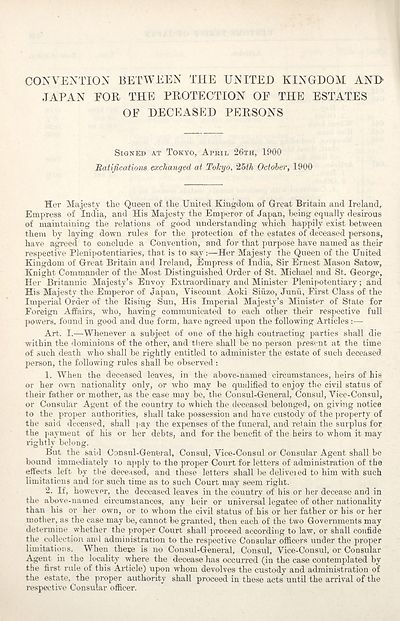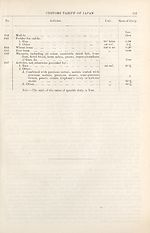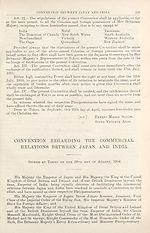1918
(290) Page 222
Download files
Complete book:
Individual page:
Thumbnail gallery: Grid view | List view

CONVENTION BETWEEN THE UNITED KINGDOM AND
JAPAN EOR THE PROTECTION OF THE ESTATES
OF DECEASED PERSONS
Signed at Tokyo, April 26th, 1900
Ratifications exchanged at Tokyo, 25th October, 1900
Her Majesty the Queen of the United Kingdom of Great Britain and Ireland,
Empress of India, and His Majesty the Emperor of Japan, being equally desirous
of maintaining the relations of good understanding which happily exist between
them by laying down rules for the protection of the estates of deceased persons,
have agreed to conclude a Convention, and for that purpose have named as their
respective Plenipotentiaries, that is to say:—Her Majesty the Queen of the United
Kingdom of Great Britain and Ireland, Empress of India, Sir Ernest Mason Satow,
Knight Commander of the Most Distinguished Order of St. Michael and St. George,
Her Britannic Majesty’s Envoy Extraordinary and Minister Plenipotentiary; and
His Majesty the Emperor of Japan, Viscount Aoki Siuzo, Junii, First Class of the
Imperial Order of the Rising Sun, His Imperial Majesty’s Minister of State for
Foreign Affairs, who, having communicated to each other their respective full
powers, found in good and due form, have agreed upon the following Articles:—
Art. I.—Whenever a subject of one of the high contracting parties shall die
within the dominions of the other, and there shall be no person present at the time
of such death who shall be rightly entitled to administer the estate of such deceased!
person, the following rules shall be observed :
1. When the deceased leaves, in the above-named circumstances, heirs of his
or her own nationality only, or who may be qualified to enjoy the civil status of
their father or mother, as the case may be, the Consul-General, Consul, Vice-Consul,
or Consular Agent of the country to which the deceased belonged, on giving notice
to the proper authorities, shall take possession and have custody of the property of
the said deceased, shall pay the expenses of the funeral, and retain the surplus for
the payment of his or her debts, and for the benefit of the heirs to whom it may
i-ightly belong.
But the said Consul-General, Consul, Vice-Consul or Consular Agent shall be
bound immediately to apply to the proper Court for letters of administration of the
effects left by the deceased, and these letters shall be deliveied to him with such
limitations and for such time as to such Court may seem right.
2. If, however, the deceased leaves in the country of his or her decease and in
the above-named circumstances, any heir or universal legatee of other nationality
than his or her own, or to whom the civil status of his or her father or his or her
mother, as the case may be, cannot be granted, then each of the two Governments may
determine whether the proper Court shall proceed according to law, or shall confide
the collection and administration to the respective Consular officers under the proper
limitations. When these is no Consul-General, Consul, Vice-Consul, or Consular
Agent in the locality where the decease has occurred (in the case contemplated by
the first rule of this Article) upon whom devolves the custody and administration of
the estate, the proper authority shall proceed in these acts until the arrival of the
respective Consular officer.
JAPAN EOR THE PROTECTION OF THE ESTATES
OF DECEASED PERSONS
Signed at Tokyo, April 26th, 1900
Ratifications exchanged at Tokyo, 25th October, 1900
Her Majesty the Queen of the United Kingdom of Great Britain and Ireland,
Empress of India, and His Majesty the Emperor of Japan, being equally desirous
of maintaining the relations of good understanding which happily exist between
them by laying down rules for the protection of the estates of deceased persons,
have agreed to conclude a Convention, and for that purpose have named as their
respective Plenipotentiaries, that is to say:—Her Majesty the Queen of the United
Kingdom of Great Britain and Ireland, Empress of India, Sir Ernest Mason Satow,
Knight Commander of the Most Distinguished Order of St. Michael and St. George,
Her Britannic Majesty’s Envoy Extraordinary and Minister Plenipotentiary; and
His Majesty the Emperor of Japan, Viscount Aoki Siuzo, Junii, First Class of the
Imperial Order of the Rising Sun, His Imperial Majesty’s Minister of State for
Foreign Affairs, who, having communicated to each other their respective full
powers, found in good and due form, have agreed upon the following Articles:—
Art. I.—Whenever a subject of one of the high contracting parties shall die
within the dominions of the other, and there shall be no person present at the time
of such death who shall be rightly entitled to administer the estate of such deceased!
person, the following rules shall be observed :
1. When the deceased leaves, in the above-named circumstances, heirs of his
or her own nationality only, or who may be qualified to enjoy the civil status of
their father or mother, as the case may be, the Consul-General, Consul, Vice-Consul,
or Consular Agent of the country to which the deceased belonged, on giving notice
to the proper authorities, shall take possession and have custody of the property of
the said deceased, shall pay the expenses of the funeral, and retain the surplus for
the payment of his or her debts, and for the benefit of the heirs to whom it may
i-ightly belong.
But the said Consul-General, Consul, Vice-Consul or Consular Agent shall be
bound immediately to apply to the proper Court for letters of administration of the
effects left by the deceased, and these letters shall be deliveied to him with such
limitations and for such time as to such Court may seem right.
2. If, however, the deceased leaves in the country of his or her decease and in
the above-named circumstances, any heir or universal legatee of other nationality
than his or her own, or to whom the civil status of his or her father or his or her
mother, as the case may be, cannot be granted, then each of the two Governments may
determine whether the proper Court shall proceed according to law, or shall confide
the collection and administration to the respective Consular officers under the proper
limitations. When these is no Consul-General, Consul, Vice-Consul, or Consular
Agent in the locality where the decease has occurred (in the case contemplated by
the first rule of this Article) upon whom devolves the custody and administration of
the estate, the proper authority shall proceed in these acts until the arrival of the
respective Consular officer.
Set display mode to:
![]() Universal Viewer |
Universal Viewer | ![]() Mirador |
Large image | Transcription
Mirador |
Large image | Transcription
Images and transcriptions on this page, including medium image downloads, may be used under the Creative Commons Attribution 4.0 International Licence unless otherwise stated. ![]()
| Asian directories and chronicles > 1918 > (290) Page 222 |
|---|
| Permanent URL | https://digital.nls.uk/194897100 |
|---|
| Attribution and copyright: |
|
|---|---|
| Description | Volumes from the Asian 'Directory and Chronicle' series covering 1917-1941, but missing 1919 and 1923. Compiled annually from a multiplicity of local sources and research. They provide listings of each country's active corporations, foreign residents and government agencies of all nationalities for that year, together with their addresses. Content includes: various treaties; coverage of conflicts; currencies and taxes; consular fees; weights and measures; public holidays; festivals and traditions. A source of information for both Western states and communities of foreigners living in Asia. Published by Hongkong Daily Press. |
|---|---|
| Shelfmark | H3.86.1303 |
| Additional NLS resources: |

